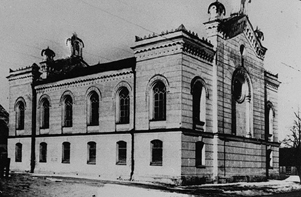When we speak of “reconstructed memory” we must analyze the discourse of forgiveness and forgetting. Being faced with an aporia of place and a collective forgiveness, the moment we open this space of worship to a new possibility of program or monumentalization we enter the discourse of remembrance and forgetting.
How to address the presence of the Synagogue in contemporary times in Latvia? How to open this discourse to the “community,” present and non-present.. How to open up the discourse of responsibility and reciprocity? How to address these places, many in oblivion, in ruin, or forgotten, recognizing their fragmentation from a temporal context? These places as the remaining presence of a culture, a community and thought intrinsic to the formation of the very place of its existence now within the rupture of its very history. How to address this place of prayer and thought when there is no longer a community to appropriate it. Or is there the possibility of a return, of the return of the witness, or the return to the witness. For in many instances when there are no longer survivors, the synagogue, or the place of the synagogue stands as a presence/absence in the very site in which it stands/stood. What does a synagogue in ruin represent? And to whom? If there is a survivor to re-inhabit it, even through a distance or in though, it is no longer in a void. Is it possible to “reconstruct” this space in its current state of ruin? Is it possible to return, to reform, and recuperate when appropriation already implies the erasure of a history, and imposes other forms? We are not speaking of preservation in architectural terms, but of preservation in ethical terms. To begin a dialogue with a silent witness without doing a violence is a difficulty we must confront. To begin the discourse of remembrance without opening a wound, without recalling, or remembering that which must be forgotten is impossibility. Jacques Derrida speaks of the “impossibility of a true possibility of forgiveness,” when speaking of a collective pardon and reciprocity when addressing “agencies, topos, places, and moments.” We must beware of the danger of re-establishing something outside of a specific socio-temporal context, for there is always the danger of reducing the “indescribable” to a symbol. The moment we open up this space, the aporia of appropriation and forgetting enters the discourse. We must begin by respecting this very place, by retracing the histories affiliated with each synagogue, and respecting the silence which has been its only form of perseverance. We are entering the aporia of the unspeakable, outside of language and representation, in the realm between the possible and impossible. We must rethink the memory onto place, and the possibilities inherent within each, and not force anything outside of their specificity……for here the place itself is the history and the possibility of a new beginning.
whole original lecture in english
Aizmiršanas paradokss - Aida Mirona
auf deutsch: De Aporie des Vergessens
|
